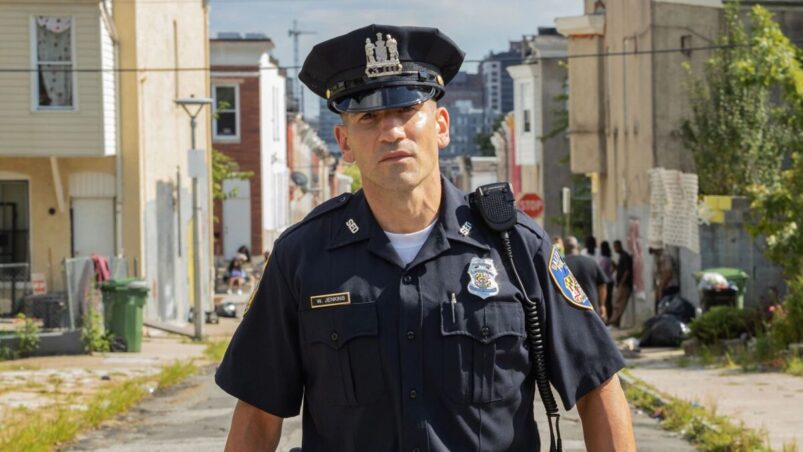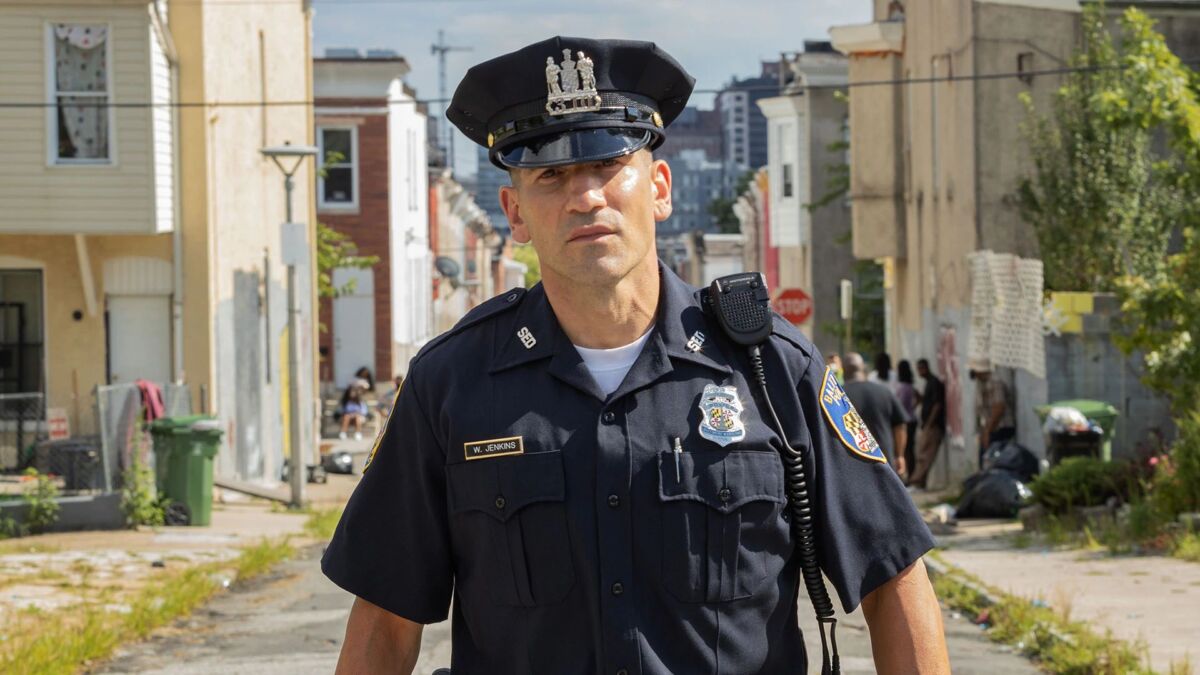In recent years, for certain real-world reasons, the cop show’s gone through a bit of a reappraisal. The quirky, relatable cops of Brooklyn 99 found themselves being hastily reworked after the death of George Floyd, fearful of being pegged as ‘copaganda’. We Own This City, a dramatisation of real events surrounding Baltimore PD’s Gun Trace Task Force, is unlikely to have that problem.
We Own This City represents creator David Simon’s beady eye roving back onto Baltimore, the city where he cut his teeth as a crime reporter, and which would make him famous as the arguable main character of his masterpiece, The Wire. Apparently that show’s frank appraisal of the corridors of power made him very unpopular with the city government, so you can only imagine how they feel about him dramatising how an elite police squad all went to jail for massive abuse of power on a truly Nixonian scale.
Like The Wire, We Own This City attempts to present a grand cross-section of society, from the footsoldiers on the street up to the mayor’s office – but is doing this in six hours, rather than The Wire’s sixty. As such, some corners get cut for the show to get across the ideas it wants to. It’s not quite on the level of Basil Exposition, but nearer than you’d expect.
This can perhaps be forgiven since We Own This City is a dramatisation of true events. In the same way, some of the Gun Trace Task Force’s victims are blameless in a way that would come off preachy in narrative fiction, but knowing that these are real people, instead it makes you distinctly queasy, as indeed it should. The line between you, the harmless viewer, and this poor innocent who’s been robbed and wrongfully arrested, cannot be seen in direct sunlight.
Initially the non-linear timeline seems like a jarring misstep, an unnecessary piece of confusion included to make it all harder to follow. It starts to hang together better as the show progresses and we get a better idea of who’s who – and, yes, it does make sense when we’re flashing back from the Gun Trace Task Force’s confessions to them actually doing these awful things. But when they need two separate devices to try and establish at what time things are happening, you can’t help but feel the strain of overreaching.
Despite a number of familiar faces from The Wire (most notably Jaime Hector, playing a conflicted cop so well you can almost forget about his previous role as an absolutely merciless drug lord) it’s newcomer Jon Bernthal who carries the show from minute one. The antidote to all those cops who don’t play by the rules but dammit they get results, Bernthal’s Wayne Jenkins is a charismatic monster, a man who not only seems to believe his own bullshit, but also to genuinely not see any reason why he as a policeman shouldn’t be stealing drugs and selling them on the side.
Wayne isn’t some attempt to dismiss the idea of the maverick teevee cop, but rather he fulfils it in a way that’ll make you think twice about cheering for the likes of Dirty Harry ever again. He really doesn’t play by the rules, and really does get results – but in this case, the results are fattening his own pockets. Which, as he himself details, were hardly starving on his base salary anyway.
It’s vaguely like one of the unspoken themes of Scorsese’s The Irishman, whose prolific criminals were committing all their myriad sins not for a glamorous Godfather-y lifestyle, but for a fairly tacky middle-class existence. But the leads of The Irishman were at least honest gangsters, from whom you might expect a bit of robbery with menaces. Wayne and his gang were specifically meant to be putting a stop to that.
And yet We Own This City isn’t afraid to show exactly why Wayne is loved by his fellow officers – not just his co-conspirators, either, but the rank and file, and that’s beyond even the devil’s bargain whereby after the death of Freddy Gray and the ensuing controversy, it’s often the nasty pieces of work who are the ones willing to actually go about the business of enforcing the law and wade into a scrap. If you too wear a badge, Wayne just seems like one of those jolly, slightly dodgy, lovable rascals, who, yes, may not play by the rules but dammit, he gets results.
This same devil’s bargain, between the Waynes of the world and the poor beige suckers who do play by the rules, is reflected not just throughout the show but possibly throughout all crime dramas, which do have a nasty tendency to make people root for the bad guys. As Yeats once noted, ‘The best lack all conviction, while the worst are full of passionate intensity’ – and it’s a passionate intensity Bernthal brings to the performance, especially with Wayne’s twisted version of the rallying speech.
I mentioned Dirty Harry earlier, because that’s the thing – millions of cop shows and action flicks have already primed us for seeing people like Wayne as the protagonist. We Own This City, despite its unabashed depiction of him doing genuinely nasty things, is happy to play along with this, often using the same kind of visual language we’d get if he really was a rule-breaking maverick with a heart of gold. He is, after all, the main character, and we’re inclined to give them the benefit of the doubt. Which, really, is half the problem.
And on the other side? Granted, the wheels of justice turn slowly, but when it comes to the people investigating the Gun Trace Task Force it all turns rather limply as well. There is the overwhelming impression that Internal Affairs finally nailed them mainly because of the task force’s own sloppiness (something we see played out again and again), rather than through any brilliant investigation.
Most of these hapless civil servants end up the recipient of moral lessons that will be familiar to fans of Simon’s work – front and centre that the war on drugs was lost long ago, and its death throes have produced the exact problems concerning police brutality that they’re now desperately trying to keep a lid on.
But while this is, quite clearly, Simon becoming slightly tetchy that the rest of the world didn’t listen to him in the first place, there’s a good degree of mea culpa in here too. Fans of The Wire will recognise a few of the sentiments Simon once put in the mouths of good police here being delivered by Wayne himself – and those who know Simon as the inspiration for classic-model cop show Homicide: Life On The Street are probably in for a shock.
After the deaths of Floyd and Gray – and, to be sure, hundreds more like them – plenty of people fancied that they knew what dirty cops were all about. But a shaky phone-camera video and an opinionated editorial cannot compare to seeing it brought to life properly being thrown in at the deep end in amongst these contemporary villains and seeing who they are and what drives them.
READ NEXT: 15 Underrated Netflix Shows You Should Watch
Some of the coverage you find on Cultured Vultures contains affiliate links, which provide us with small commissions based on purchases made from visiting our site. We cover gaming news, movie reviews, wrestling and much more.




